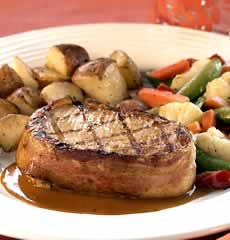 Have you ever sat at the dinner table in front of steamed veggies, a lean and seasoned pork chop, mashed potatoes, and a cold glass of milk, wondering whether consuming this meal is sinful -- opposed to Christian teaching?
Have you ever sat at the dinner table in front of steamed veggies, a lean and seasoned pork chop, mashed potatoes, and a cold glass of milk, wondering whether consuming this meal is sinful -- opposed to Christian teaching?Some Christians, for religious reasons, object to that lean and seasoned pork chop being on the dinner table. Citing Leviticus 11 and Deuteronomy 14, they insist that it is "unclean meat," which God forbade the ancient Israelites to eat. That much is true -- God DID command them to avoid certain meats. But do these laws pertain to Christians -- now?
I thought they did. I was raised in a church that taught it was a sin for a Christian to eat pork, lobster, shrimp, catfish, and a host of other foods. I believed that to do so was to disobey God's instructions, and that it was the cause for numerous health problems in society. Listing various "clean" and "unclean" meats, the Bible presented us with a divine diet. I believed it was the Maker's menu for the health of humankind.
When I was older, however, I reached another conclusion. Based on a more fair and critical examination of Scripture, I came to understand the historic Christian understanding of these and certain other laws -- that they were given to a particular audience and were not intended to apply universally to all societies throughout the ages.
Very simply, in the interest of time (and your attention span), here is my belief regarding clean and unclean meats:
While it is possible that unrecorded health issues of the time were included, God gave Israel their dietary laws as a sign or reminder that He separated them from among the other sinful nations to be His people. Since God is no longer dealing primarily with the nation of Israel, but calling all nations to repent and to be His people, the laws that distinguished Israel from her neighbors have served their purpose. They do not directly pertain to our circumstances, and therefore serve no practical purpose now.
Wherever these clean and unclean meats are discussed in Scripture, the reason for them is either implied or explicitly stated. It is most clearly stated in the following passage:Leviticus 20:24-26:As Christians, we are free to choose to avoid certain meats (or even all meats) based on conscience and nutritional views. It is a mistake, however, to claim biblical authority for demanding that catfish dinners be banished from the Christian's menu.
I am the LORD your God, who has set you apart from the nations. You must therefore make a distinction between clean and unclean animals and between unclean and clean birds. Do not defile yourselves by any animal or bird or anything that moves along the ground—those which I have set apart as unclean for you. You are to be holy to me because I, the LORD, am holy, and I have set you apart from the nations to be my own.


